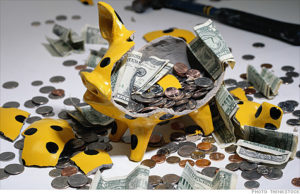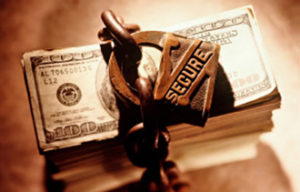The Best Ways To Keep On Top Of Your Finances
 Keeping your finances in check is a very important thing to do in the 21st century. You’re going to need to be able to keep everything where it is because the world revolves around money! Everything you need and want you have to pay for with money, including your house and food, so it’s important to make sure it’s all in order so you don’t go without anything, but how can you do it? Well, if you read on, you’ll learn how!
Keeping your finances in check is a very important thing to do in the 21st century. You’re going to need to be able to keep everything where it is because the world revolves around money! Everything you need and want you have to pay for with money, including your house and food, so it’s important to make sure it’s all in order so you don’t go without anything, but how can you do it? Well, if you read on, you’ll learn how!
Keep A Good Credit Score
Credit scores have been around for a while but have only recently become used, so what is it? Well, your credit score is a representation of how good your financial standings are in terms of credit. It takes into account things like how much credit has been used in your past, how long it’s taken you to pay it back and if there were any discrepancies with the payment. When you apply for a loan, banks will look at your credit score and judge you off it; if it’s in a poor state then they’re going to be likely to turn you down for the applied loan, however if your credit score is good then you’re going to be in the green and get your loan! Not getting loans can become a very serious problem if you need to money urgently, so we need to find a way around this, and luckily there is. Websites like usarepaircreditinc.com are able to repair your credit score by filtering through very small loans and repayments through your account, improving your credit score so you don’t have to worry about getting turned down for a loan ever again!
Opening A Savings Account
Savings accounts are brilliant ways to raise money without actually having to do anything or invest anywhere, so what are they? They are small accounts that are attached to your main bank account and serve as a way to store money. Each month, your savings account will take a predetermined amount of money from your main bank account into your savings account, which will stack up and accumulate after a while. You can open these accounts from banks like american express, and the real beauty of them is revealed once you’ve been paying into them for a few years. You’re going to have a sum of money that has interest on it so that it grows within the account, which can be a huge amount depending on how long you leave it! This can get you through a rainy day when you need funds but don’t have the available in your bank account. Another good thing about them is that they are temptation free; you need not worry about accidently spending what is in your savings account because you are unable to access it with your card, perfect for anyone that might find themselves buying extra things because they think the money is there which makes it a great tool for keeping on top of your money.
Debt Consolidation
Having and dealing with debt is part of life, and an unavoidable one at that too! Debt just means something that you need to pay back, and with the amount of things we have to borrow money for in the 21st century this covers a lot of things. Debt can come in the form of credit card payments, loan repayments, mortgages and so on, and the single thing that makes them a pain is how many there are. Debts become a problem when you’ve got lots of them; they become hard to follow and track, which means that you’re going to struggle a bit trying to work out how much money is going out of your account each month to what company! This means it’s more difficult to budget, meaning that life gets more difficult. However there is a solution. Debt consolidation loans that you can find more about if you read on at DebtConsolidationUSA.com, operate in a way that allows all of your debt repayments to be funneled into one, monthly repayment. This reduces the amount of tracking down money you have to do, you know how much you’re going to have to pay at the end of the month in one easy instalment making life easier for you!
Smart Meters
This is a great way to keep a track of how much you’re going to be spending on your utility bills at the end of the month! Smart meters are installed into your system, and it will gather data from all of the different sources your house pulls from, mainly being electricity, gas and water. It will be able to read how much of each commodity you have used, and by inputting how much you pay for a given volume or measurement of each of the commodities, it can tell you how much you’ve used and therefore how much it’s going to cost at the end of the month. It will be able to make basic predictions about your resource usage so you can effectively plan for the month ahead by knowing how much your bills are going to be instead of being stuck doing guesswork like the days of old!
Coupon Shopping
Everyone loves coupons; they’re given to us by supermarkets and other retailers and give us brilliant discounts that we then go and take full advantage of, but there is a problem with them. Nothing in the world comes for free, and unfortunately neither do coupons; they’re given away when a customer spends over a certain amount, which means that if you don’t reach the quota like a lot of us won’t, you’re not going to be eligible for the coupon and this means you’re going to miss out! So what can we do to circumvent this? Well, websites like groupon exist to serve this purpose for us. They have online coupons available for free, for everyone to use however they’re only available for a limited time so if you’re wanting to use something for a later date it’s best to do it sooner rather than later! They’re able to do this because the company coupons are a form of advertising, meaning that it’s completely legal and nothing for you to worry about getting in trouble for. Some coupon sites are illegal though, so you will have to use your head and avoid websites that look dodgy to save yourself from having a nightmare!
Budgeting Properly
Budgeting is the key to managing your finances properly, it’s an essential skill that you need to learn in order to be able to properly manage your finances. Budgeting involves being able to plan out where your money is going to go for the next month, or where it should be going at least! You’re going to have to know how much you spend each month on each bill that you have to pay, as well as for food and taking into account how much money you’re going to be putting away each month! This can all be very difficult to do when you’re starting off and chances are that you’re not going to be able to do it very well, but there is a helping hand available to you! Online budget planners are available for free on the internet, which you should take advantage of if you find yourself struggling! They’re able to take out all of the pain of trying to do all the maths work manually; instead, these planners do it for you and show how much money you’re going to have at the end of the month and how much you should be saving each payday to keep some spare.
It’s recommended to do all of these things to make sure that you keep on top of everything to do with your money, if you have a good credit score you’re not going to have to worry about getting refused for a loan when you need it most, you’ll have a savings account that you can dip into as and when you need it for those days that cost just the little bit extra, you could have yourself a debt consolidation loan to help you pay back all those small niggling debts that somehow creep up on you, a smart meter so you know exactly what your bills are going to be that month too. And then to top it all off you’ll have loads of coupons at your disposal to make your life cheaper and you’ll have a proper budget so you know what your plan for your money is for the month! When you’ve got all this income, it’s important to not only know where to spend it, but how to protect it once you’ve spent it. If you go out and buy something new with all your savings, only for it to break, you’ve just lost yourself a lot of money, so if you want to know how to keep what you invest in safe then read this!
















